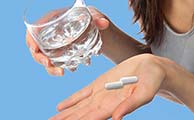MRSA UTI Treatment: Natural and Antibiotic Therapies

Cranberry extracts have been proven to inhibit Staph aureus and MRSA, and may speed MRSA UTI recovery when combined with either antibiotics or natural remedies.
Antibiotic treatments are the norm when dealing with MRSA urinary tract infections. However, many people find that antibiotics do not help, and they need a different kind of MRSA UTI treatment in order to get better.
Additionally, many primary care doctors will prescribe a broad spectrum antibiotic for any UTI or bladder infection without getting the proper testing done first. Using first line broad spectrum antibiotics for UTI infections is now linked to antibiotic resistance for these primary care treatments.
Fortunately for many, there are natural and supportive supplements and therapies you can add to your current antibiotic treatment to increase your chance for success. Or, if your current antibiotic treatments aren’t working, natural therapies may be your answer.
Standard Medical Treatments for Resistant Staph or MRSA UTIs
Antibiotics are the main treatment prescribed by doctors for Staph or MRSA UTIs. They type prescribed varies depending upon the infection’s severity, your age, health status and other factors. Many of the standard UTI antibiotics are ineffective against MRSA, which is multi-drug resistant.
When dealing with MRSA, you need to get cultured first, so a narrow spectrum antibiotic that’s proven to work against your particular strain of infection can be prescribed.
A note on catheters
If you are currently using a urinary catheter (which inserts into the urethra to remove urine from the bladder), removal is recommended as catheters are often the source of infecting MRSA or Staph bacteria. Catheter associated UTI (CAUTI) tend to be more antibiotic resistant, especially for those catheter infections acquired within a hospital.
Commonly prescribed antibiotics for MRSA urinary infections can include:

Studies show primary care antibiotics for UTIs cause antibiotic resistance.
- Trimethoprim-sulfamethoxazole (also known as TMP-SMX, Bactrim or Setpra) is the most common treatment for UTI’s. Part of this antibiotic is a sulfa drug in which drug allergies and intolerance are quite common. Trimethoprim alone may also be prescribed. However, with growing resistance of MRSA to either of these antibiotics, they should first be tested against your infection to ensure they work.
- Tetracycline antibiotics should also be tested first to ensure it works for your strain of MRSA.
- Nitrofurantoin
- Fosfomycin trometamol is a single dose antibiotic and is the most expensive
- Flouroquinolones such as Ciprofloxacin (Cirpro) and Lefofloxacin are also prescribed. However recent 2012 guidelines by the Infectious Diseases Society of America (IDSA) has recommended reserving flouroquinolones because they have been shown to cause a higher level of antibiotic resistance (and some bad side effects) and are associated with causing MRSA colonization among those who use them.
- IV Antibiotics: Oral antibiotics are commonly used for MRSA urinary tract infections. However, for severe or complicated UTI infections (or where resistance to the oral antibiotics is shown upon urine culture testing), IV antibiotics such as Vancomycin will be used.
Note: Linezolid or Zyvox is sometimes used as a last resort drug for MRSA, but it does not get eliminated through the kidneys and bladder in high enough concentrations and thus is not a good choice for UTIs. The list of antibiotics is changing as antibiotic resistance in MRSA grows .
Natural Medicine and Supportive Therapies

Remedies are a very effective alternative when it comes to treating MRSA and Staph.
Many people report failure of antibiotics to work, especially for recurrent infections. Frequent use of antibiotics also can create more resistant strains of MRSA bacteria. As such, many people need another option.
Some treatment and supportive options to consider are:
Garlic extracts – allicin extracts have been proven to fight MRSA. They can be taken internally to fight the infection. Click here for more details on garlic.
Essential oils – some oils have excellent activity against MRSA. They can be massaged into the skin over the bladder area, added to normal baths, or added to a sitz bath to target the genital area. Some oils that are active against MRSA that can be taken internally are oregano, rosemary, thyme and Spice Oil Blends (although they must be of very high quality to use internally). See more on essential oils here.
D-mannose – this simple natural sugar is one of the active ingredients in cranberries (why cranberries are good for urinary health) and it may also help with a MRSA UTI as it does for other bladder infections. D-mannose simply makes the bladder and urethra slippery and difficult for bacteria to attach and grow, and make them easier to “flush out” when urinating. My favorite is “D-Mannose with Cranactin” (a cranberry extract) from Soloray, and I have used this several times to treat bladder infections without using anything else.
Probiotics – probiotics are one of the best things you can do to protect your body against infections. Just like your gut, your urinary tract is also full of good bacteria that help protect and acidify the area to help protect from infection. If you’ve taken antibiotics in the past, be sure to take a good probiotic to replenish your beneficial bacteria. If you’re currently taking antibiotics, be sure to take a probiotic as well, just not at the same time as your antibiotic. Probiotics also help guard against GI or intestinal tract infections like C. diff.
Uva Ursi – (Arctostaphylos uva ursi) which is also called bearberry is one of the most common antibacterial botanicals for UTIs. It also has antibacterial qualities and has been used successfully against recurrent bladder infections caused by Staph aureus (the bacteria that causes MRSA), E. coli and many others. This is an herb and can be found as capsules and liquid tinctures.
Oregon Grape – (Berberis aquifolium) contains a substance known as berberine, which can stop bacteria from adhering to the walls of the intestine and urinary tract. It can be used as a tea to help wash away bacteria. It can be also be used in dried capsules or liquid tincture to treat digestive tract conditions like infectious diarrhea.
Cranberries – Cranberry extracts have been proven to inhibit the growth of both Staph aureus and MRSA bacteria. These extracts have also been proven to inhibit production of their biofilm structures which protect the bacteria from antibiotics and some natural treatments. As such, adding cranberry extracts to your treatment regimen may shorten your infection. And because they inhibit biofilm production, they should be considered for prevention as well
Holistic UTI support

Fluids help support bladder health and flush bacteria from your system
Your ability to ward off bladder and urinary tract infections can be enhanced or weakened in a number of ways. One important example is the acidity level inside the urinary tract. When the acidity level drops, you become more prone to these infections.
Some factors that lower your acidity levels make you more prone to infection are:
- Good bacteria – beneficial bacteria are such an important factor. Unfortunately, antibiotic use kills off your “good bacteria”, leaving you more prone to infection. Lactobacilli are normal and beneficial bacterial residents in the urinary tract and they help keep your system more acidic and less vulnerable to infection.
- Menopause– menopause in women causes a loss in estrogen levels and reduces the urinary tract acidity level.
- Fluids – drinking lots of fluids, especially water, helps flush bad bacteria out of your system. Be sure to avoid alcohol, citrus fruit juices and caffeinated beverages, including cranberry juice. While cranberry juice is often recommended for bladder infections, it also has a lot of sugar which feeds bacteria and helps them grow more. D-mannose (see natural treatments above) is a better alternative, or use cranberry capsules.
Other Helpful Resources:
Natural Approaches to Prevention and Treatment of Infections of the Lower Urinary Tract, Kathleen A. Head, ND; Alternative Medicine Review, Volume 13, Number 3, 2008.
https://www.thorne.com/altmedrev/.fulltext/13/3/227.pdf
References:
1. Urinary tract infections, www.healthcentral.com
2. Guidelines (2008) for the prophylaxis and treatment of methicillin-resistant Staphylococcus aureus (MRSA) infections in the United Kingdom, J. Antimicrob. Chemother. (2009) https://jac.oxfordjournals.org/content/early/2009/03/12/jac.dkp065.full
3. Uncomplicated Urinary Tract Infections: A Focus on Women’s Health, 2012, https://www.uspharmacist.com/content/c/36643/#sthash.qqLXN2Ka.dpuf
4. Effect of antibiotic prescribing in primary care on antimicrobial resistance in individual patients: systematic review and meta-analysis: BMJ 2010;340:c2096, (Published 19 May 2010) https://dx.doi.org/10.1136/bmj.c2096
5. Natural Approaches to Prevention and Treatment of Infections of the Lower Urinary Tract, Kathleen A. Head, ND; Alternative Medicine Review, Volume 13, Number 3, 2008. www.thorne.com/altmedrev/.fulltext/13/3/227.pdf
6. Effects of cranberry extracts on growth and biofilm production of Escherichia coli and Staphylococcus species. LaPlante KL, Sarkisian SA, Woodmansee S, Rowley DC, Seeram NP. Phytother Res. 2012 Sep;26(9):1371-4. https://www.ncbi.nlm.nih.gov/pubmed/22294419








